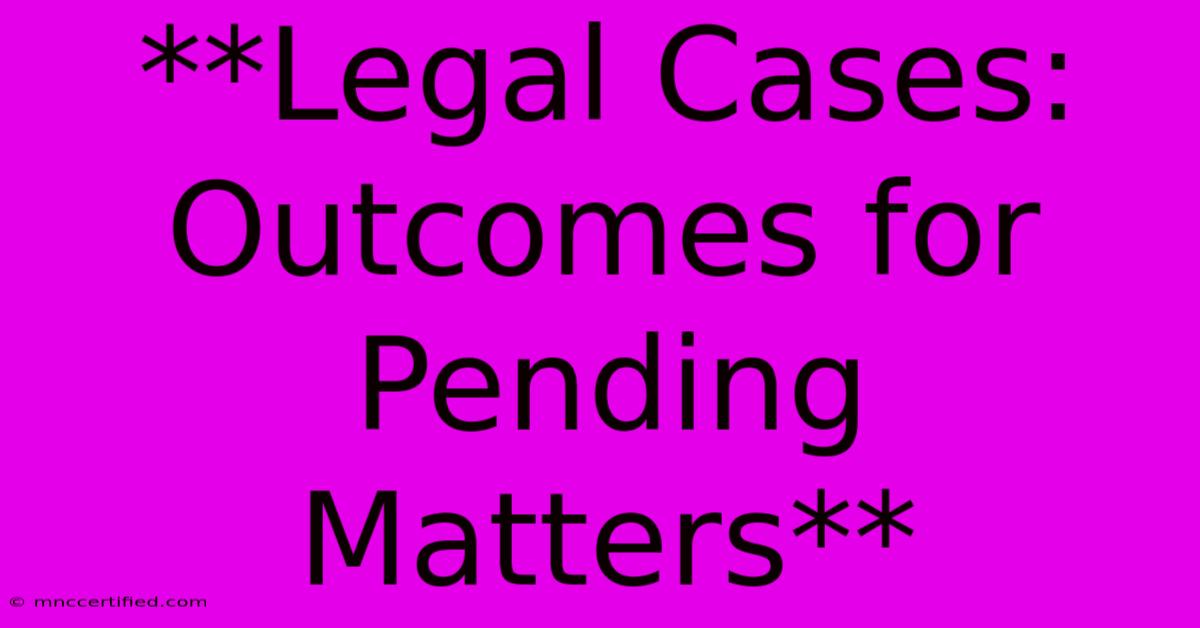**Legal Cases: Outcomes For Pending Matters**

Table of Contents
Legal Cases: Outcomes for Pending Matters
Navigating the legal system can be a complex and often stressful process. Understanding the possible outcomes for pending legal matters is essential for making informed decisions and managing expectations. This article provides a comprehensive overview of potential outcomes for cases still in progress, covering both civil and criminal proceedings.
Understanding the Legal System
Before diving into possible outcomes, it's crucial to understand the fundamental differences between civil and criminal cases:
Civil Cases:
- Purpose: To resolve disputes between individuals or entities.
- Burden of Proof: Preponderance of the evidence (more likely than not).
- Outcomes: Monetary damages, injunctions, specific performance, and other remedies.
Criminal Cases:
- Purpose: To punish individuals for crimes against society.
- Burden of Proof: Beyond a reasonable doubt (very high standard).
- Outcomes: Jail time, fines, probation, and other forms of punishment.
Common Outcomes for Pending Legal Matters
While every case is unique, several common outcomes emerge for both civil and criminal proceedings:
1. Settlement
- Definition: Parties involved agree to resolve the dispute outside of a formal court hearing.
- Benefits: Faster resolution, lower legal costs, and more control over the outcome.
- How it Works: Parties negotiate a mutually acceptable agreement, often involving a compromise.
2. Dismissal
- Definition: The court terminates the case without a full trial.
- Reasons: Insufficient evidence, procedural errors, or lack of legal basis.
- Types: Voluntary dismissal (initiated by the plaintiff), involuntary dismissal (initiated by the court).
3. Summary Judgment
- Definition: The court grants judgment in favor of one party without a full trial.
- Requirements: No genuine dispute of material fact, the moving party is entitled to judgment as a matter of law.
- Benefits: Provides a quick resolution, eliminates the need for a trial.
4. Trial
- Definition: A formal court proceeding where evidence is presented and a verdict is reached.
- Outcome: Judgment in favor of either the plaintiff (civil) or the prosecution (criminal).
- Post-Trial Motions: Parties may file motions to overturn or modify the judgment.
5. Appeal
- Definition: A party who disagrees with the trial court's decision can appeal to a higher court.
- Outcome: The higher court can affirm, reverse, or modify the trial court's decision.
Specific Outcomes for Criminal Cases
In addition to the general outcomes above, criminal cases have additional possibilities:
- Plea Bargain: The defendant pleads guilty to a lesser charge or agrees to a reduced sentence in exchange for avoiding a trial.
- Acquittal: The jury finds the defendant not guilty of the charges.
- Mistrial: The trial ends prematurely due to a procedural error or other unforeseen circumstances.
Factors Influencing Case Outcomes
Several factors can influence the outcome of a legal case:
- Strength of Evidence: The quality and quantity of evidence presented will significantly impact the outcome.
- Legal Arguments: The persuasiveness of the legal arguments presented by both sides.
- Courtroom Procedure: Adherence to rules and procedures can impact the outcome.
- Judge or Jury: The judge's rulings or the jury's verdict play a crucial role in decision-making.
- Negotiation Skills: In settlement cases, skilled negotiation can lead to favorable outcomes.
Conclusion
Navigating the legal system can be daunting, but understanding potential outcomes for pending legal matters is essential for informed decision-making. From settlement and dismissal to trial and appeal, various options are available, each with its own consequences. By seeking legal guidance and carefully considering all possibilities, individuals and entities can increase their chances of a favorable outcome.
Remember: This information is for educational purposes only and should not be considered legal advice. Always consult with an experienced legal professional for guidance on specific legal matters.

Thank you for visiting our website wich cover about **Legal Cases: Outcomes For Pending Matters** . We hope the information provided has been useful to you. Feel free to contact us if you have any questions or need further assistance. See you next time and dont miss to bookmark.
Featured Posts
-
Ace Insurance Company Claims Phone Number
Nov 07, 2024
-
Musiala We Had To Win After Benfica Victory
Nov 07, 2024
-
Siu Edwardsville Vs Indiana Photo Gallery
Nov 07, 2024
-
Us Senate Republicans Reclaim Majority
Nov 07, 2024
-
Trade Sanctions New Office New Impact
Nov 07, 2024